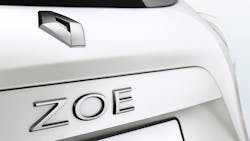Renault Defends Electric-Car Head Start with Longer-Range Zoe
Renault SA (IW 1000/66) is nearly doubling the range of the battery-powered Zoe city car to keep ahead of competitors as they ramp up electric-vehicle offerings in the wake of Volkswagen AG’s diesel-cheating scandal.
The Zoe will be able to travel as far as 400 kilometers (250 miles) on a single charge, compared with 240 kilometers now, the French carmaker said at the Paris Motor Show. That exceeds the Tesla Model 3’s advertised range of 345 kilometers.
While the extra capability will boost the Zoe’s price tag by 3,500 euros to 23,600 euros (US$26,500) in France, the move is critical to Chief Executive Officer Carlos Ghosn’s effort to maintain an edge in electric vehicles. Despite tepid demand for battery-powered cars, Renault is betting that wider adoption is around the corner.
“Our vision of the electric market is that it is not a niche market,” Eric Feunteun, Renault’s chief of electric vehicles, said in an interview. “It is a strategy that started seven years ago and is unwavering.”
Renault and its alliance partner Nissan Motor Co. were early believers in the electric car, investing 4 billion euros to develop cars including the Zoe, the Twizy scooter and the Nissan Leaf. But demand has come up short. The group has so far sold about 350,000 electric vehicles since the Leaf’s rollout in 2010, a far cry from a target of delivering 1.5 million by the end of 2016.
Tighter Pollution Standards
That could now change as carmakers face increasing pressure to woo consumers to electric cars to meet ever tighter pollution standards. By 2021, average fleet emissions in the European Union need to drop to 95 grams of carbon dioxide per kilometer from the 2015 target of 130g CO2/km. That efficiency improvement over the next five years would be more than double the gains made since 2010 and could be harder to reach with the future of efficient diesel engines compromised by Volkswagen’s emissions cheating.
The aftermath of the scandal as well as the emergence of Tesla Motors Inc. are prompting Volkswagen and other auto manufacturers to develop more stand-alone electric vehicles, a departure from the past approach of largely converting conventional models. Volkswagen alone plans to introduce 30 battery-powered cars by 2025.
To fend off rivals, Renault will intensify collaboration with Nissan on electric vehicles. The partners avoided producing similar models -- the Leaf is about 36 centimeters (14 inches) longer than the Zoe -- in order to gauge demand for different segments, Feunteun said. To boost volume, Renault-Nissan also plan to roll out electric vehicles in countries where they haven’t been offered yet, he said.
“Now we are in a situation where we see things much more clearly, and we need to accelerate synergies and economies of scale,” Feunteun said.
By Ania Nussbaum
About the Author
Bloomberg
Licensed content from Bloomberg, copyright 2016.
